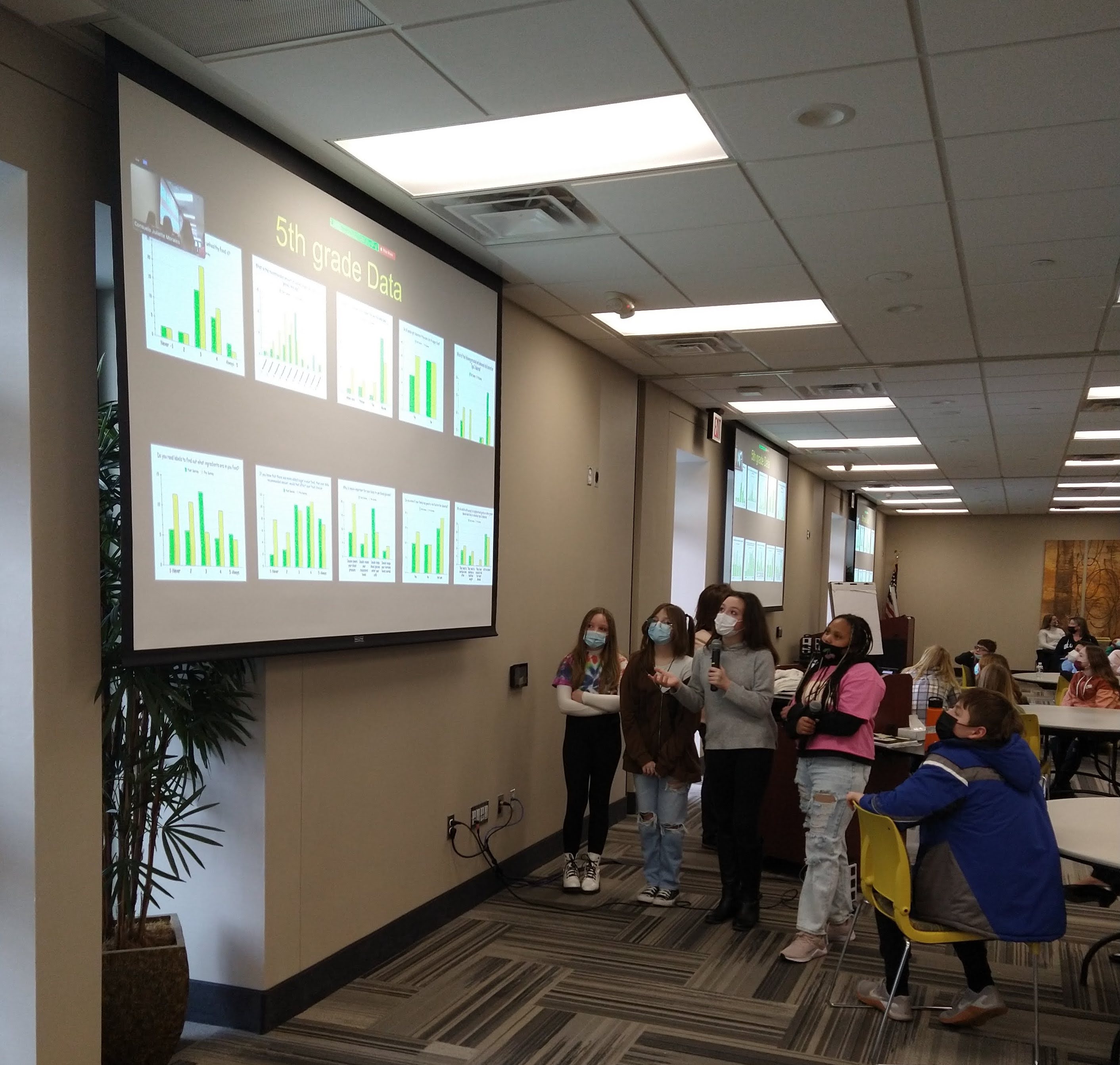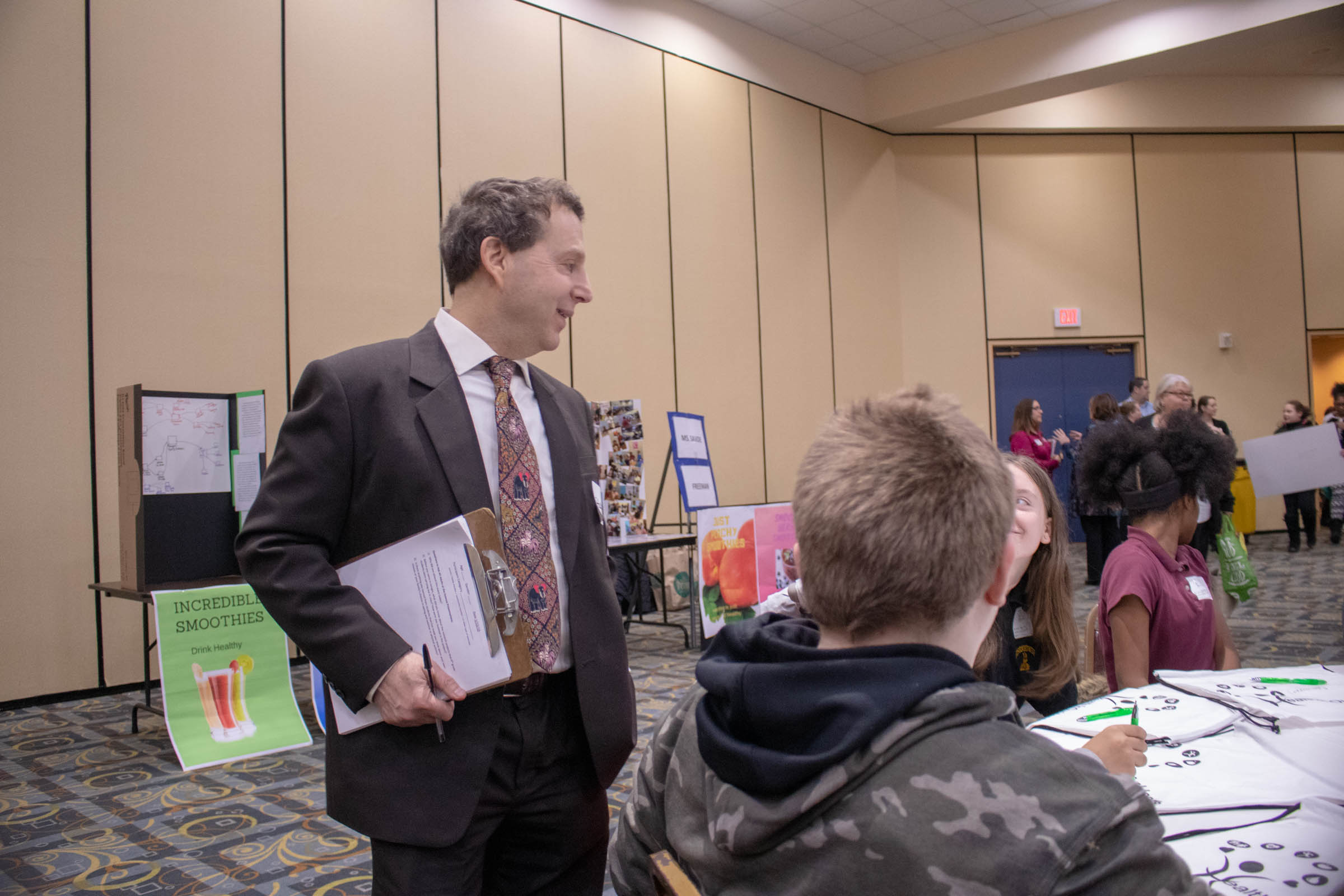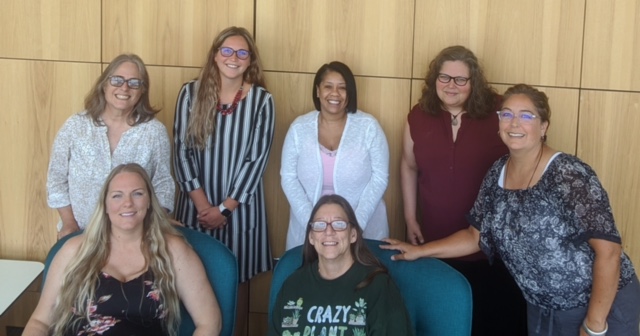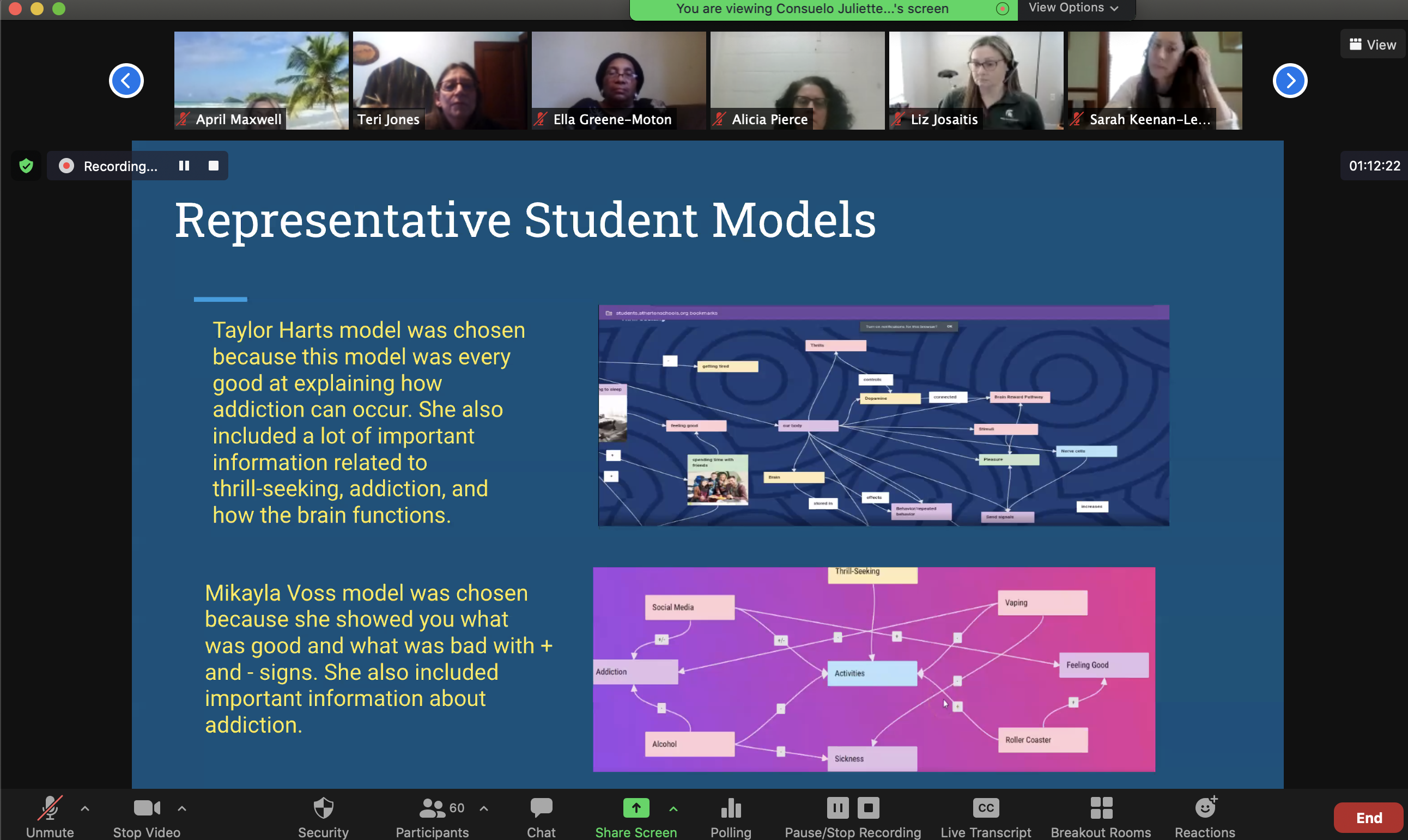News
Montrose Rams Are Excited About Science

Sixth grade students from Kuehn-Haven Middle School with Montrose Community Schools finished up their studies of type 2 diabetes by presenting their Community Action Research Projects to family and friends on Wednesday, January 19th, 2022, at the Genesee Career Institute (GCI). This fall, they learned about diabetes, genetics and nutrition in their science class through their studies of “Health in Our Hands: What Controls Our Health?” Their studies culminated in their research project to study how health education can affect people's knowledge, attitudes, and maybe even behavior. At their school, they hosted a Health Summit and shared presentations about how genetics, environment, and nutrition can have an impact on risk for diabetes. They taught their peers how to read food labels.
Students presented their results at GCI explaining how their data and graphs showed increased understanding about diabetes and the importance of eating healthy by those who attended the event at their school. They thanked their teacher, Mrs. Kelly Sanborn for her dedication and for making science fun!
“This year in science I have learned how much sugar and other unhealthy foods can affect my body in different ways. Ever since I learned about this stuff, I have been trying to eat healthier things,” said Bee Swzed, 6th grade presenter.
In addition to presenting, students were able to take part in a tour of GCI educational and technical programs for high school students. The GCI staff members conducted a thrilling tour of health and STEM-related classrooms and labs. Particularly popular were the Crime Scene Lab and the Video Gaming Design Program. Tour guides emphasized the math and writing skills needed to be successful in these programs and encouraged young women to consider fields such as Welding and Diesel Mechanic.
Although external community partners were not able to attend due to the recent surge in Omicron, we were able to arrange for three groups of students to present their findings and discuss their recommendations during the Health in Our Hands (HiOH)-Flint/Genesee Partnership Meeting which took place the next day.
HiOH is a research project led by CREATE for STEM Institute at Michigan State University in a community-academic-school partnership, supported by the NIH Science Education Partnership Award (SEPA).
Flint/Genesee Partners Find Expert Mentors for the Science Classroom

For the past two years, Tara Moreno-Wallen has identified speakers to talk to 8th graders in Flint and Atherton Community Schools as part of Health in Our Hands: “How can looking for thrills make me miserable?”
Eighth graders study substance use disorder and an important part of their journey is an interview that they conduct with a person recovering from substance use disorder from their community. From this face-to-face experience, they build a better understanding of the mechanism of addiction, and how thrill seeking can become a maladaptive behavior.
One student shared, “My main takeaways from this research is that addiction is a terrible process of pain and regret. Something that surprised me and made me think about, was that how close to home it hit me, because I had a family member go through the same thing. In all honesty, anyone can be at risk of SUD. I think people should learn from my research that addition is not fun and that it can hurt you and the ones around you.”
Ms. Moreno-Wallen is the Executive Director of Serenity House of Flint, and a member of the HiOH Flint/Genesee Partnership. The HiOH-Flint/Genesee Partnership connects our classrooms to their community by identifying classroom experts and mentoring community action research projects, listening to students’ findings and recommendations and celebrating their achievements at health summit events, and working to sustain this innovative model of science learning and community action for students in Flint and Genesee County. Experts have included nutritionists, an urban planner, and FoodCorps members.
Student Perceive Value in Science Learning Increased Following Health in Our Hands

In October, Dr. Stephen Modell presented "Impact of Diabetes and Addiction Project-based Learning in a Genetics Education Program for Underserved Schools and Communities” at the 2021 APHA Annual Meeting in Denver as part of the School Health and Wellness Section, with co-sponsorship by the Genomics Forum. Based on pre/post surveys, following completion of the HiOH curriculum, students perceived science as being more important to their lives and reported sharing more about what they learned in science class with their peers and family members. Using chronic and behavioral conditions can be a powerful way for middle school students to learn about genetics.
Teachers Prepare for Face-to-Face STEM Education During Professional Learning Sessions

After months of rigorous planning, the Health in Our Hands team began summer professional learning in July in preparation for middle school units, “What controls my health?” (Diabetes) and “How can looking for thrills make me miserable?” (Substance Use Disorder-SUD). The professional learning, hosted by the Genesee Intermediate School District (GISD), began with two virtual sessions. In attendance were seven teachers from Flint Community Schools, Atherton Community Schools, Genesee STEM Academy,Montrose Community Schools, and Wayne-Westland Community Schools. Two additional sessions were held face-to-face in July for SUD teachers. However Diabetes was delayed until late August as several teachers were needed for summer school teaching and districts finalized late position hires.
In preparation for return to the classroom, the virtual sessions began with community building where teachers discussed times when they have participated in a professional learning group that exhibited inclusion (where their voice was heard and valued). Teachers also discussed their classroom norms and the transition from traditional face-to-face learning to virtual classrooms, then back to face-to-face as the trajectory for this upcoming 2021-22 school year.
Teachers then separated into two groups (Diabetes and SUD) to experience a “sample teach” where they took on the learner role to experience the phenomenon and initial activities of their curriculum. Teachers usedJamboard, an interactive digital whiteboard by Google, that to construct a driving question board which supports students in “figuring out.” Teachers also constructed models. From there, teachers launched into a close inspection of the Health in Our Hands units and how they incorporate Next Generation Science Standards and principles of Project-Based Learning.
During the last two face-to-face sessions, SUD teachers experienced a lab using a “Science Take Out” kit to learn about the role of the brain reward in addiction. To build relationships and prepare for the final Health Summit that will take place in December, teachers were also introduced to community partners Leyla Sankar from University of Michigan-Flint Discovery Place and Alaina Larrea from Greater Flint Health Coalition, These partners represented the HiOH-Flint/Genesee Partnership, a collaborative whose mission is to connect the science classroom to community health through student centered learning and action research. They shared resources to support students and families, teachers and schools.
“HiOH professional learning is extensive and of critical importance to students' learning and development of a STEM mindset,” said Renee Bayer, HiOH principal investigator. “Through these initial sessions, teachers gain an understanding of project-based learning, begin to demonstrate the instructional shifts necessary to help students meet the new Michigan Science Standards, and feel confident to teach the first 3 learning sets of the unit.”
Teachers from Holmes STEM, Atherton and Montrose will begin enacting HiOH units this fall. We will host health summits, where students share their community action projects with the community planned for the second week of December.
Student Learning Prevails Amid Pandemic in Genesee County

Health in Our Hands-Flint/Genesee Partners hosted a two-day virtual health summit to highlight middle school community action projects aimed at reducing the risk of critical community health issues.
Flint, Michigan – February 01, 2021 – Even faced with a pandemic and online learning, students in Genesee County have had the opportunity to learn about their health in science class. Atherton Junior High School, Flint Holmes STEM Middle School Academy and Montrose Kuehn-Haven Middle School students presented their findings from community action projects and recommendations for ways to prevent or reduce substance use disorder and Type 2 diabetes. The virtual health summits, attended by approximately 300 students, teachers, school administrators, parents, and leaders and health experts from the community, occurred on January 13th and 20th via videoconference.
Students have been studying the biology of Type 2 diabetes and substance use disorder (SUD) in a science curriculum called, “Health in Our Hands” (HiOH). The curriculum connects the science classroom to the community to give youth and adults an understanding of modern concepts in genetics. Students investigate critical community health concerns and use these real-world contexts to appreciate the importance of both genetic and environmental factors in their risk for disease. For their final project, students conduct a community action research project to improve their school or neighborhood to help prevent or reduce disease. As part of their projects, students conducted interviews of family members, their peers, and experts from Serenity House of Flint and the CRIM Fitness Foundation as means of data collection.
Students who studied SUD at Atherton and Flint Holmes STEM Middle School examined the research question, “How do risk and protective factors affect substance use disorder among family members and peers and in my community?” During interviews with experts, students from Flint Holmes STEM Middle School discovered the impact of family influence on help-seeking behaviors of individuals suffering from SUD. One student explained, “When the interviewee said that she decided to stay sober because of her baby, that showed me no matter what, she was willing to go through years of rehab just for the sake of her child. That's some real dedication.” Students from Atherton focused on the effect of peers: "My main takeaways are that SUD is a disorder that can have multiple causes and effects. Some causes could be peer pressure, family issues, and even the victim’s own emotions. Based on this, I can infer that everyone who feels and thinks are [sic] at risk for SUD.”
Students from both schools concluded that because SUD behaviors often start in middle school, more youth activities and substance use support focused on that age group are needed in school and community settings. Reflecting on their experience, one student said, “I learned that science isn't only about energy but it also helps us by explaining why drugs are bad and you shouldn't use them.”
Students from Montrose Kuehn-Haven Middle School who studied Type 2 diabetes researched the question, “How does knowing about added sugar affect future food choices?” by investigating the effect on students’ attitudes about healthy food and school menu choices. Using health communication techniques, the students developed and shared a PSA (public service announcement) about added sugar with fellow students. Students have already seen the impact of their research, reporting, “We spoke with our school’s Food Supervisor and told her our concerns about the amount of sugar in our school breakfast. Our school breakfast now has less sugar and more fruit and is much healthier.”
Students at Flint Holmes STEM Middle School and Atherton Junior High explored healthier choices at home. They examined nutrition labels on food items and conducted a “Banana Smoothie Taste Test” to look for ways to reduce added sugar in their diets. Flint students recommended: “Look at nutritional labels, stay away from junk food, work out, serve healthier lunches containing fruits and vegetables at school, and have community-driven fruit and vegetable distributions similar to water distribution.” Atherton students concluded, “There are many ways that we eat sugars everyday without knowing and it is important to know what is in the foods we eat in order to stay healthy…. We can’t control our genetics but we can control what we put into our bodies to help prevent diseases, especially diabetes.”
The Virtual Health Summits were organized by the Health in Our Hands-Flint/Genesee Partnership, a coalition of community, health, and education organizations dedicated to achieving success and sustainability of Health In Our Hands in Flint and beyond. Coalition members include Community Based Organization Partners of Flint, Atherton Community Schools, CRIM Fitness Foundation, Flint Community Schools, Genesee Intermediate School District, Greater Flint Health Coalition, Health Alliance Plan, Michigan State University-Extension, and University of Michigan-Flint Discovering Place. Health in Our Hands is a project of CREATE for STEM Institute at Michigan State University funded by a Science Education Partnership Award (SEPA), National Institute of General Medical Sciences (NIGMS) of the National Institutes of Health.


